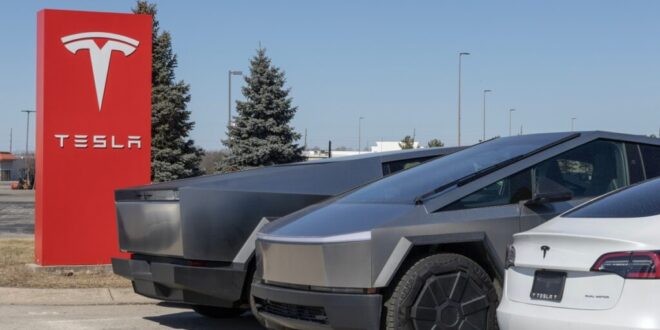Tesla is set for a launch in Saudi Arabia, this April. The company will showcase vehicles like the Cybertruck in a new chapter of its Middle East growth.
Credit : Shutterstock / Jonathan Weiss
Tesla has finally launched its electric vehicles in Saudi Arabia. Sales will begin on April 10th.
Elon Musk’s relationship with Saudi leaders has changed dramatically since the move. The rift began in 2018, when Musk failed to buy Tesla.
The announcement was made via the company’s website. It revealed plans for an event of high profile in Riyadh. The Tesla lineup will be on display, along with solar-powered devices and futuristic tech such as the Cybercab robot and humanoid. Pop-up shops will open in Jeddah the next day, Riyadh the next, and Dammam on that same day. Long-term investments are planned for beyond 2025.
Tesla’s Saudi Arrival: A market opportunity or a strategic move?
Though Tesla has a strong presence in the UAE and elsewhere in the region, it’s been notably absent from Saudi Arabia—the Gulf’s largest auto market, where EVs currently make up just 1 per cent of car sales. Lack of charging infrastructure in Saudi Arabia and the preference for large petrol cars has hindered uptake.
Even so, the competition is already in place. China’s BYD and Lucid Motors—part-owned by Saudi’s Public Investment Fund (PIF)—are already selling EVs locally. PIF has invested in a brand of domestic EVs called Ceer, which is yet to launch.
The rocky history between Musk and the kingdom stems from a controversial tweet in 2018, where Musk claimed he had “funding secured” to take Tesla private—after discussions with PIF. The tweet led both to lawsuits by investors and public friction between Musk (and PIF Governor Yasir al-Rumayyan), with leaked text messages showing their strained relationship.
Signs of a thaw are emerging. Musk and Rumayyan appeared at an UFC fight held in New York, alongside former US President Donald Trump. Musk made a surprise visit to Riyadh for the Future Investment Initiative summit a few weeks ago.
Tesla’s Saudi Launch comes amid Global Challenges
Tesla’s entry into the Saudi Arabian market comes as the company faces increasing pressure. Sales of EVs in Europe dropped by 42%. In the US, the brand was criticized for Musk’s political ties and his leadership of Department of Government Efficiency.
Back home, Tesla has been targeted by protesters and has seen ‘Tesla Takedown’ demonstrations over job losses, foreign aid freezes and scrapped programmes. In spite of this, Tesla continues to grow globally. The Saudi launch represents a new revenue stream as well as a political re-set.
Musk’s Middle East aspirations could be shaped in part by Tesla’s Saudi Arabia venture. With a billion-dollar EV industry slowly taking shape, and with renewed political ties.
 Costa News Spain Breaking News | English News in Spain.
Costa News Spain Breaking News | English News in Spain.






